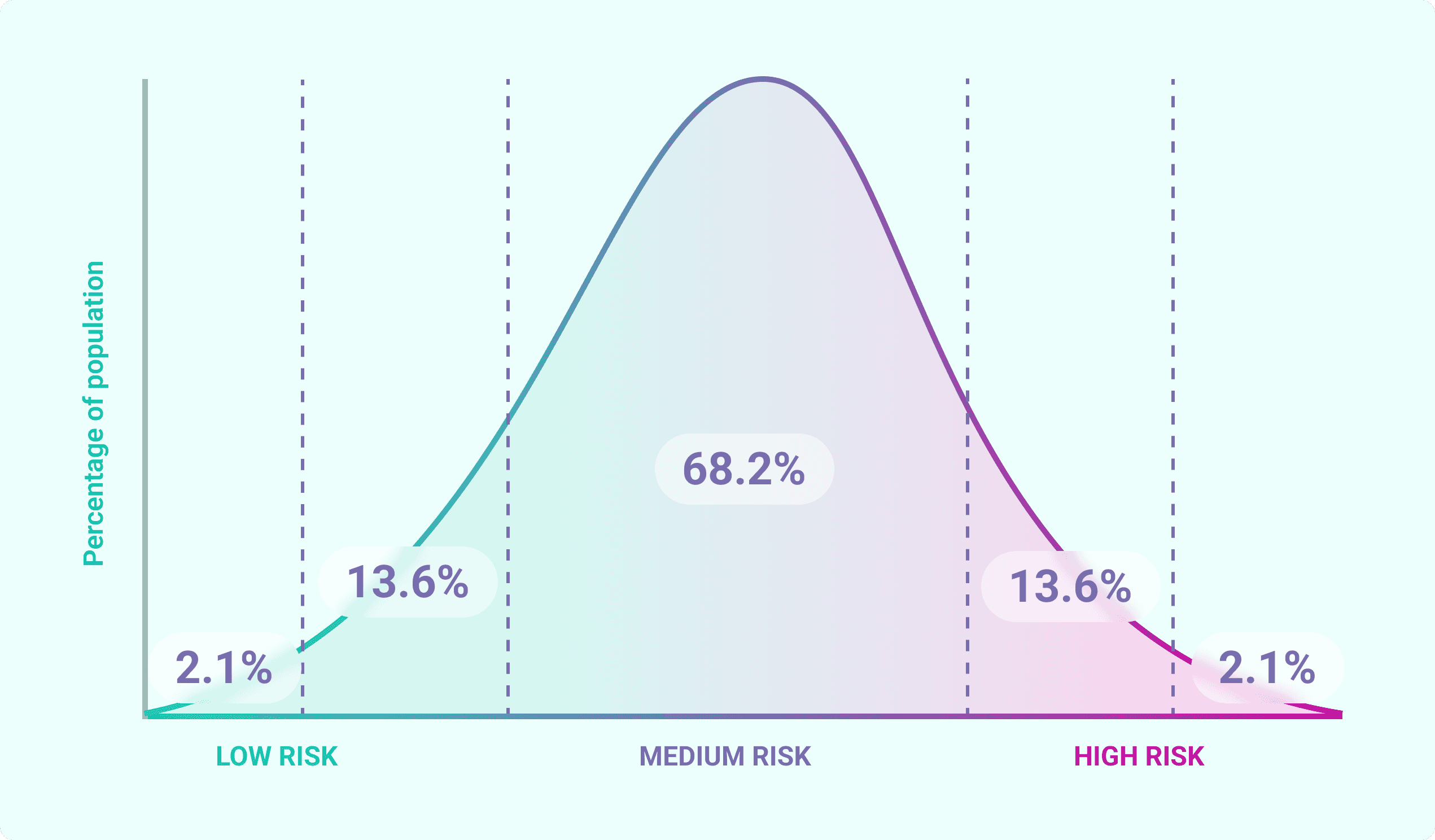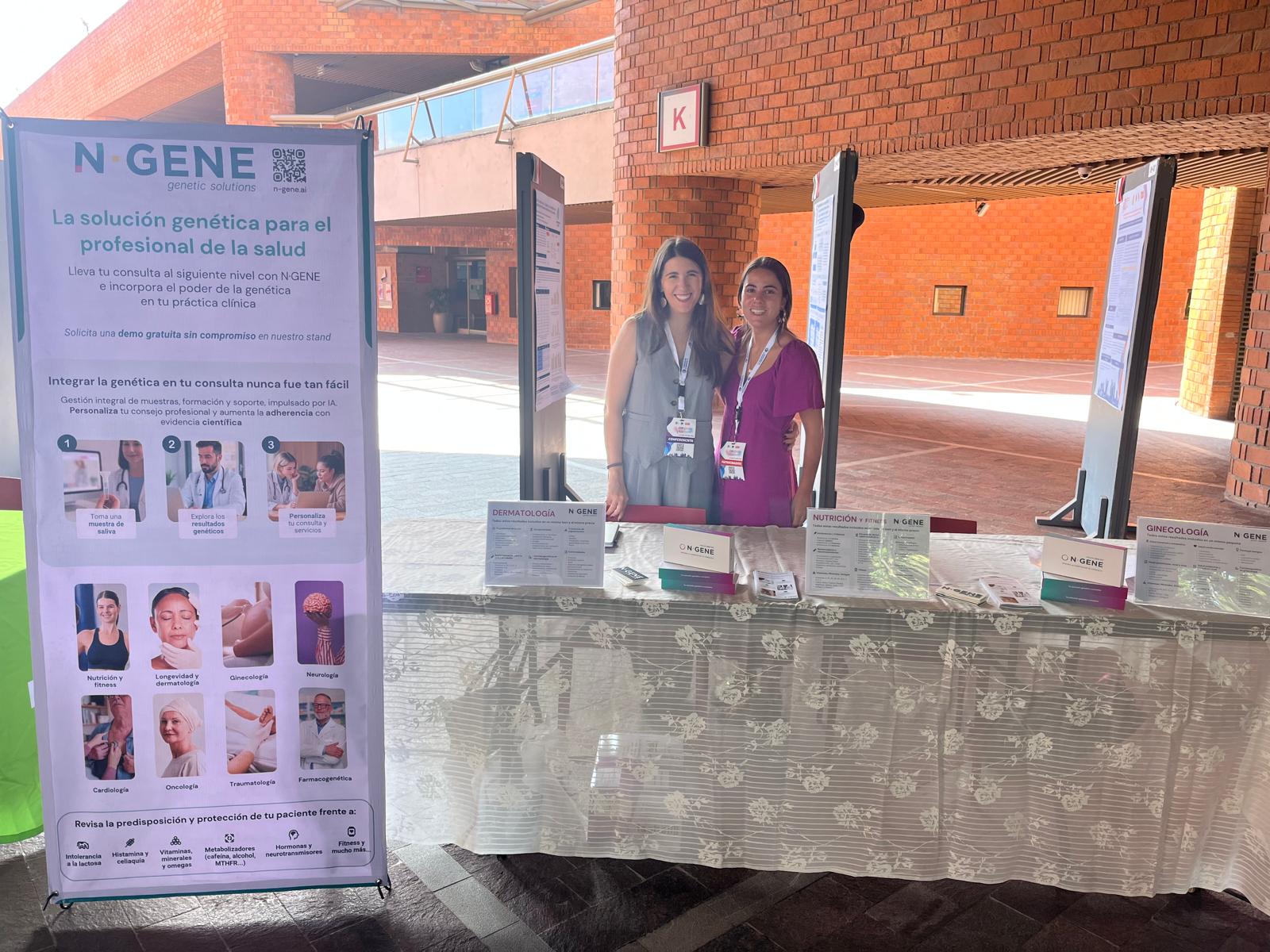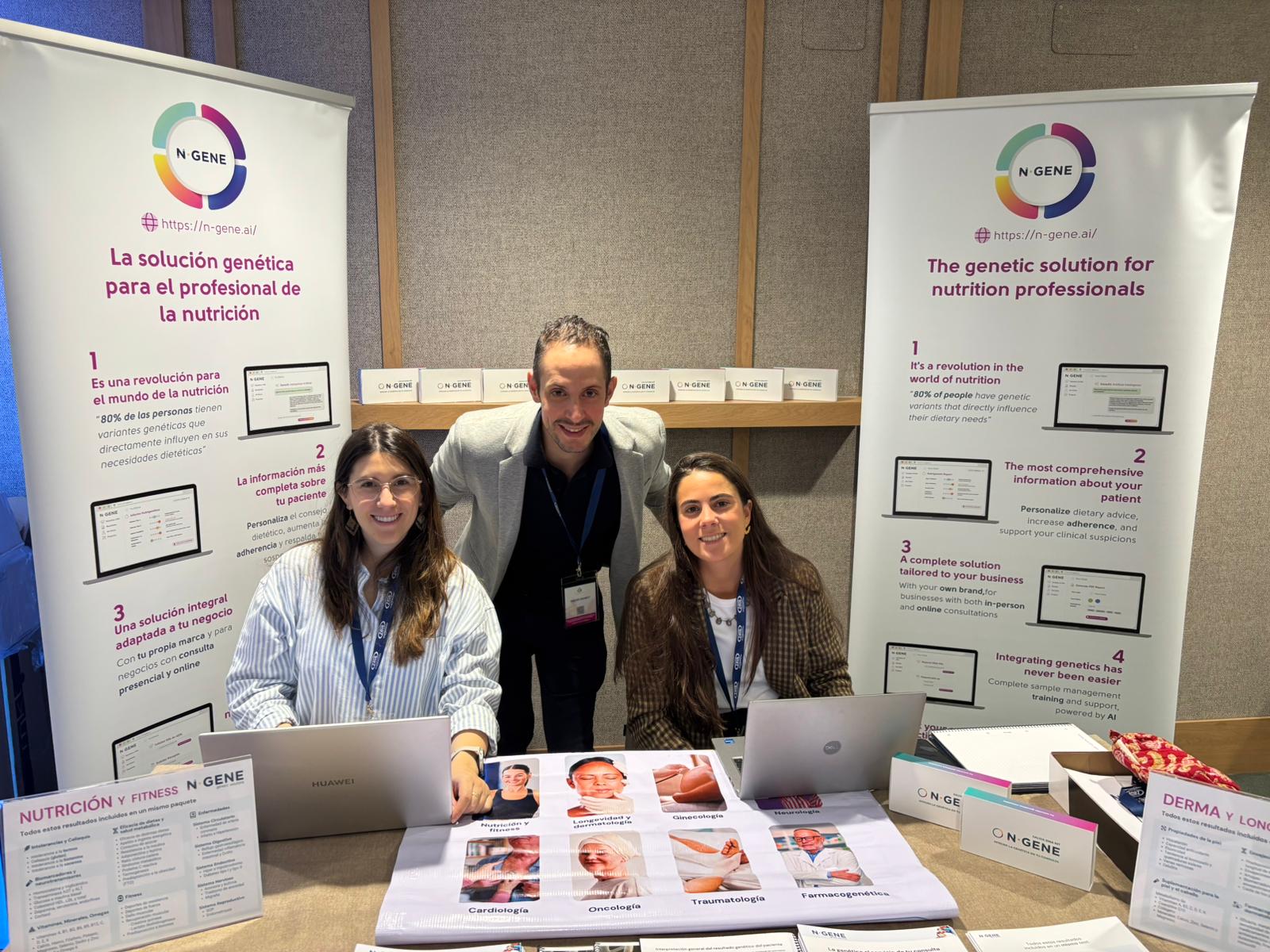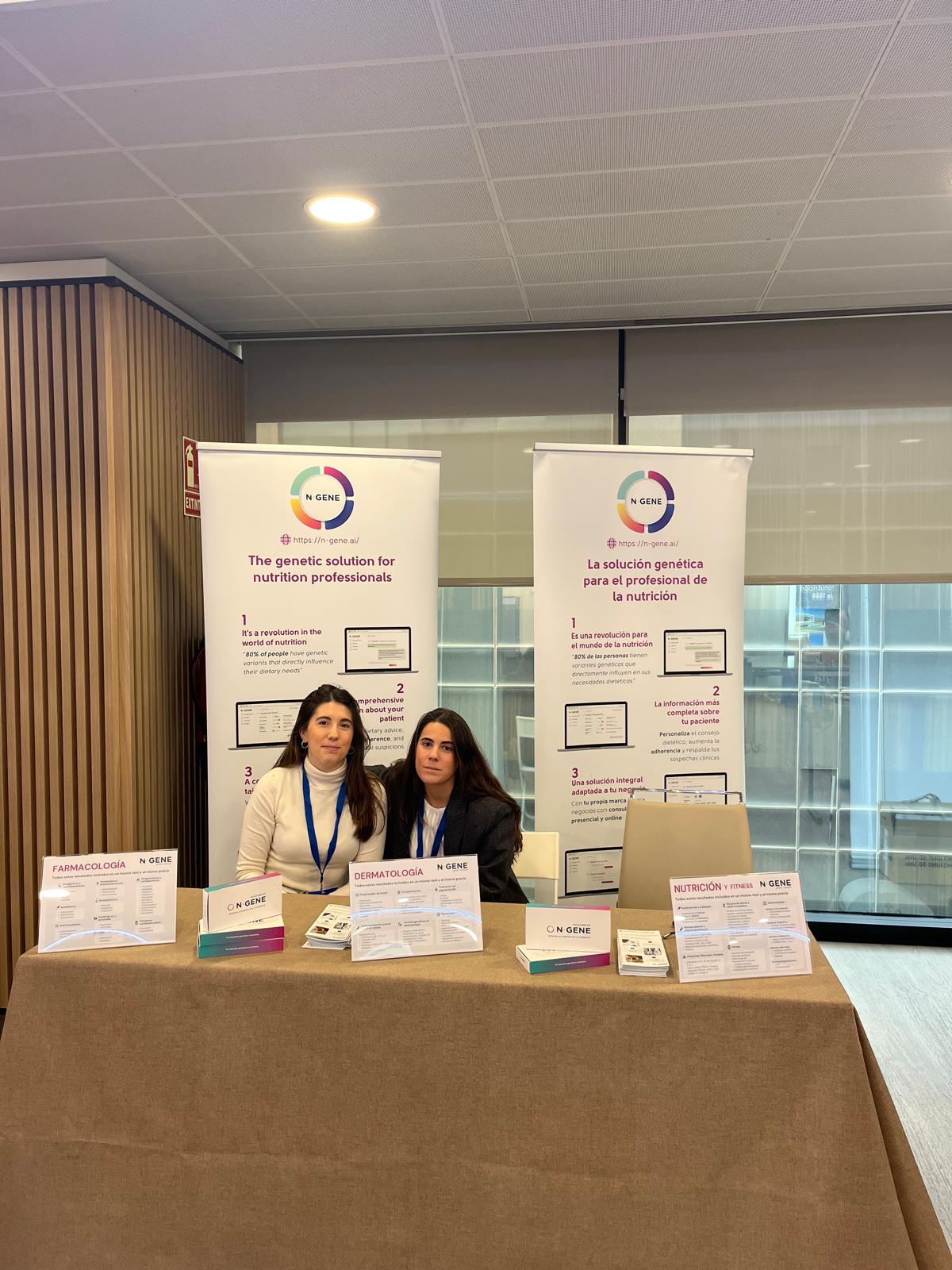The science behind PRS
The science behind PRS
The science behind PRS
Discover how genetics is revolutionizing personalized medicine and improving patients' lives



What are PRS?
Polygenic Risk Scores (PRS) are like a personalized score that summarizes how your genes influence the risk of developing certain diseases.
This is how the PRS work
Make data-driven decisions and anticipate potential risks
We identify genetic variants that may influence health
Based on large-scale genetic studies (GWAS), the variants associated with specific diseases are selected.




We assign a weight to each variant based on its contribution to risk
We assign a weight to each variant based on its contribution to risk
We add the weighted values to generate a unique score.
We add the weighted values to generate a unique score.
The weighted variants are combined into a score that represents the polygenic risk.


How are the results interpreted?
PRS analyzes small differences in DNA (genetic variants) and adds their impact to generate a personalized score. This score compares the predisposition to certain diseases with that of the general population, helping to identify relative risks and make preventive decisions.



This allows to identify those who could benefit from specific interventions and to compare their score with the general population to better understand their relative risk.
Take advantage of all the benefits

Customization
Customization
Adjust health recommendations based on each patient's unique genetics

Customization
Adjust health recommendations based on each patient's unique genetics

Prevention
Prevention
Identify risks before symptoms appear

Prevention
Identify risks before symptoms appear

Scientific Backup
Scientific Backup
Based on genome-wide association studies (GWAS) with millions of data points.

Scientific Backup
Based on genome-wide association studies (GWAS) with millions of data points.
We value privacy
We value privacy
Genetic information is extremely sensitive. At N-GENE, we guarantee total protection of patient data through advanced encryption measures and strict data handling policies. We do not share or use genetic information for any purpose without the user's explicit consent.
Genetic information is extremely sensitive. At N-GENE, we guarantee total protection of patient data through advanced encryption measures and strict data handling policies. We do not share or use genetic information for any purpose without the user's explicit consent.
Genetic information is extremely sensitive. At N-GENE, we guarantee total protection of patient data through advanced encryption measures and strict data handling policies. We do not share or use genetic information for any purpose without the user's explicit consent.


Proprietary predictive models
We actively contribute to science and the world of health.
Alzheimer
Pulmonary embolism
Type 1 diabetes
Menopause
Our bioinformatician Sandra Ferreiro López and our CTO Jorge Blom-Dahl at the I Congress of the Spanish Society of Bioinformatics and Computational Biology (SEBiBC, 2024) with a scientific poster focused on the development of a predictive model of Alzheimer’s disease, based on the integration of genetic variants and clinical phenotypic variables.
The work is supported by a K-Nearest Neighbors (KNN) machine learning model that achieves an 80% sensitivity, highlighting the value of combining genetic information with easily obtainable variables in clinical practice —such as age or diabetes diagnosis— to identify early profiles at greater risk.
Proprietary predictive models
We actively contribute to science and the world of health.
Alzheimer
Pulmonary embolism
Type 1 diabetes
Menopause
Our bioinformatician Sandra Ferreiro López and our CTO Jorge Blom-Dahl at the I Congress of the Spanish Society of Bioinformatics and Computational Biology (SEBiBC, 2024) with a scientific poster focused on the development of a predictive model of Alzheimer’s disease, based on the integration of genetic variants and clinical phenotypic variables.
The work is supported by a K-Nearest Neighbors (KNN) machine learning model that achieves an 80% sensitivity, highlighting the value of combining genetic information with easily obtainable variables in clinical practice —such as age or diabetes diagnosis— to identify early profiles at greater risk.
Own predictive models
We actively contribute to science and the world of health.
Alzheimer
Pulmonary embolism
Type 1 diabetes
Menopause

Our bioinformatician Sandra Ferreiro López and our CTO Jorge Blom-Dahl at the I Congress of the Spanish Society of Bioinformatics and Computational Biology (SEBiBC, 2024) with a scientific poster focused on the development of a predictive model of Alzheimer’s disease, based on the integration of genetic variants and clinical phenotypic variables.
The work is supported by a K-Nearest Neighbors (KNN) machine learning model that achieves an 80% sensitivity, highlighting the value of combining genetic information with easily obtainable variables in clinical practice —such as age or diabetes diagnosis— to identify early profiles at greater risk.
Own predictive models
We actively contribute to science and the world of health.
Alzheimer
Pulmonary embolism
Type 1 diabetes
Menopause

Our bioinformatician Sandra Ferreiro López and our CTO Jorge Blom-Dahl at the I Congress of the Spanish Society of Bioinformatics and Computational Biology (SEBiBC, 2024) with a scientific poster focused on the development of a predictive model of Alzheimer’s disease, based on the integration of genetic variants and clinical phenotypic variables.
The work is supported by a K-Nearest Neighbors (KNN) machine learning model that achieves an 80% sensitivity, highlighting the value of combining genetic information with easily obtainable variables in clinical practice —such as age or diabetes diagnosis— to identify early profiles at greater risk.
















Our outreach activity
PRS and its implications for the future of patient care
Our bioinformatician Sandra Ferreiro López and our CEO Guillermo Pérez-Solero participated in the roundtable organized by DNAnexus (2024) where the intersection between genotypic imputation and the generation of PRS was discussed. Strategies for analyzing large-scale datasets and the impact of these methods on future research and patient care were addressed.


Our outreach activity
BIOSPAIN – Organized by ASEBIO
Our CSO, Jair Antonio Tenorio, and our Head of the Scientific Area, Sandra Ferreiro López, at the largest biotechnology event organized by a national bioindustry association in Europe and one of the largest in the world in terms of one-to-one meetings and participating companies. This event was an exceptional opportunity to stay updated on the latest trends and advancements in the sector (2023, 2021)


Our outreach activity
X International Congress SESAP (Spanish Society of Precision Health)
N-GENE participated in the X International Congress of the Spanish Society of Precision Health (SESAP), presenting its genetic platform to healthcare professionals interested in precision medicine and establishing direct contact with clinicians, researchers, and entities in the sector.


Our outreach activity
VII International Congress of the College of Nutritionists / X Ibero-American Congress of Nutrition
In the international field, N-GENE was present at the VII International Congress of the Mexican College of Nutritionists and at the X Ibero-American Congress of Nutrition (Ibero-American Congress of Nutrition) with a booth and presentation by our Dr. Marta Alonso. During the event, the N-GENE team presented the clinical application of genetics in nutrition.


Our outreach activity
Influceliacos
N-GENE participated in Influcelíacos, an event aimed at patients, collaborating as institutional support in an outreach initiative in health, focused on clinical accompaniment and health education.


Our outreach activity
23rd International Congress on Anti-Aging Medicine and Aesthetic Medicine
In the field of preventive medicine, longevity, and precision medicine, N-GENE was part of the XXIII International Congress on Anti-Aging Medicine and Aesthetic Medicine (SEMAL) with a stand and a presentation by our Dr. Jair Tenorio. It focused on the use of genetics as support for prevention, risk stratification, and personalized clinical decision-making.


Our outreach activity
PRS and its implications for the future of patient care
Our bioinformatician Sandra Ferreiro López and our CEO Guillermo Pérez-Solero participated in the roundtable organized by DNAnexus (2024) where the intersection between genotypic imputation and the generation of PRS was discussed. Strategies for analyzing large-scale datasets and the impact of these methods on future research and patient care were addressed.


Our outreach activity
BIOSPAIN – Organized by ASEBIO
Our CSO, Jair Antonio Tenorio, and our Head of the Scientific Area, Sandra Ferreiro López, at the largest biotechnology event organized by a national bioindustry association in Europe and one of the largest in the world in terms of one-to-one meetings and participating companies. This event was an exceptional opportunity to stay updated on the latest trends and advancements in the sector (2023, 2021)


Our outreach activity
X International Congress SESAP (Spanish Society of Precision Health)
N-GENE participated in the X International Congress of the Spanish Society of Precision Health (SESAP), presenting its genetic platform to healthcare professionals interested in precision medicine and establishing direct contact with clinicians, researchers, and entities in the sector.


Our outreach activity
VII International Congress of the College of Nutritionists / X Ibero-American Congress of Nutrition
In the international field, N-GENE was present at the VII International Congress of the Mexican College of Nutritionists and at the X Ibero-American Congress of Nutrition (Ibero-American Congress of Nutrition) with a booth and presentation by our Dr. Marta Alonso. During the event, the N-GENE team presented the clinical application of genetics in nutrition.


Our outreach activity
Influceliacos
N-GENE participated in Influcelíacos, an event aimed at patients, collaborating as institutional support in an outreach initiative in health, focused on clinical accompaniment and health education.


Our outreach activity
23rd International Congress on Anti-Aging Medicine and Aesthetic Medicine
In the field of preventive medicine, longevity, and precision medicine, N-GENE was part of the XXIII International Congress on Anti-Aging Medicine and Aesthetic Medicine (SEMAL) with a stand and a presentation by our Dr. Jair Tenorio. It focused on the use of genetics as support for prevention, risk stratification, and personalized clinical decision-making.


Our outreach activity
PRS and its implications for the future of patient care
Our bioinformatician Sandra Ferreiro López and our CEO Guillermo Pérez-Solero participated in the roundtable organized by DNAnexus (2024) where the intersection between genotypic imputation and the generation of PRS was discussed. Strategies for analyzing large-scale datasets and the impact of these methods on future research and patient care were addressed.


Our outreach activity
BIOSPAIN – Organized by ASEBIO
Our CSO, Jair Antonio Tenorio, and our Head of the Scientific Area, Sandra Ferreiro López, at the largest biotechnology event organized by a national bioindustry association in Europe and one of the largest in the world in terms of one-to-one meetings and participating companies. This event was an exceptional opportunity to stay updated on the latest trends and advancements in the sector (2023, 2021)


Our outreach activity
X International Congress SESAP (Spanish Society of Precision Health)
N-GENE participated in the X International Congress of the Spanish Society of Precision Health (SESAP), presenting its genetic platform to healthcare professionals interested in precision medicine and establishing direct contact with clinicians, researchers, and entities in the sector.


Our outreach activity
VII International Congress of the College of Nutritionists / X Ibero-American Congress of Nutrition
In the international field, N-GENE was present at the VII International Congress of the Mexican College of Nutritionists and at the X Ibero-American Congress of Nutrition (Ibero-American Congress of Nutrition) with a booth and presentation by our Dr. Marta Alonso. During the event, the N-GENE team presented the clinical application of genetics in nutrition.


Our outreach activity
Influceliacos
N-GENE participated in Influcelíacos, an event aimed at patients, collaborating as institutional support in an outreach initiative in health, focused on clinical accompaniment and health education.


Our outreach activity
23rd International Congress on Anti-Aging Medicine and Aesthetic Medicine
In the field of preventive medicine, longevity, and precision medicine, N-GENE was part of the XXIII International Congress on Anti-Aging Medicine and Aesthetic Medicine (SEMAL) with a stand and a presentation by our Dr. Jair Tenorio. It focused on the use of genetics as support for prevention, risk stratification, and personalized clinical decision-making.


Our outreach activity
PRS and its implications for the future of patient care
Our bioinformatician Sandra Ferreiro López and our CEO Guillermo Pérez-Solero participated in the roundtable organized by DNAnexus (2024) where the intersection between genotypic imputation and the generation of PRS was discussed. Strategies for analyzing large-scale datasets and the impact of these methods on future research and patient care were addressed.


Our outreach activity
BIOSPAIN – Organized by ASEBIO
Our CSO, Jair Antonio Tenorio, and our Head of the Scientific Area, Sandra Ferreiro López, at the largest biotechnology event organized by a national bioindustry association in Europe and one of the largest in the world in terms of one-to-one meetings and participating companies. This event was an exceptional opportunity to stay updated on the latest trends and advancements in the sector (2023, 2021)


Our outreach activity
X International Congress SESAP (Spanish Society of Precision Health)
N-GENE participated in the X International Congress of the Spanish Society of Precision Health (SESAP), presenting its genetic platform to healthcare professionals interested in precision medicine and establishing direct contact with clinicians, researchers, and entities in the sector.


Our outreach activity
VII International Congress of the College of Nutritionists / X Ibero-American Congress of Nutrition
In the international field, N-GENE was present at the VII International Congress of the Mexican College of Nutritionists and at the X Ibero-American Congress of Nutrition (Ibero-American Congress of Nutrition) with a booth and presentation by our Dr. Marta Alonso. During the event, the N-GENE team presented the clinical application of genetics in nutrition.


Our outreach activity
Influceliacos
N-GENE participated in Influcelíacos, an event aimed at patients, collaborating as institutional support in an outreach initiative in health, focused on clinical accompaniment and health education.


Our outreach activity
23rd International Congress on Anti-Aging Medicine and Aesthetic Medicine
In the field of preventive medicine, longevity, and precision medicine, N-GENE was part of the XXIII International Congress on Anti-Aging Medicine and Aesthetic Medicine (SEMAL) with a stand and a presentation by our Dr. Jair Tenorio. It focused on the use of genetics as support for prevention, risk stratification, and personalized clinical decision-making.


Our outreach activity
BIOSPAIN – Organized by ASEBIO
Our CSO, Jair Antonio Tenorio, and our Head of the Scientific Area, Sandra Ferreiro López, at the largest biotechnology event organized by a national bioindustry association in Europe and one of the largest in the world in terms of one-to-one meetings and participating companies. This event was an exceptional opportunity to stay updated on the latest trends and advancements in the sector (2023, 2021)


Our outreach activity
PRS and its implications for the future of patient care
Our bioinformatician Sandra Ferreiro López and our CEO Guillermo Pérez-Solero participated in the roundtable organized by DNAnexus (2024) where the intersection between genotypic imputation and the generation of PRS was discussed. Strategies for analyzing large-scale datasets and the impact of these methods on future research and patient care were addressed.

Our outreach activity
X International Congress SESAP (Spanish Society of Precision Health)
N-GENE participated in the X International Congress of the Spanish Society of Precision Health (SESAP), presenting its genetic platform to healthcare professionals interested in precision medicine and establishing direct contact with clinicians, researchers, and entities in the sector.


Our outreach activity
VII International Congress of the College of Nutritionists / X Ibero-American Congress of Nutrition
In the international field, N-GENE was present at the VII International Congress of the Mexican College of Nutritionists and at the X Ibero-American Congress of Nutrition (Ibero-American Congress of Nutrition) with a booth and presentation by our Dr. Marta Alonso. During the event, the N-GENE team presented the clinical application of genetics in nutrition.


Our outreach activity
Influceliacos
N-GENE participated in Influcelíacos, an event aimed at patients, collaborating as institutional support in an outreach initiative in health, focused on clinical accompaniment and health education.


Our outreach activity
23rd International Congress on Anti-Aging Medicine and Aesthetic Medicine
In the field of preventive medicine, longevity, and precision medicine, N-GENE was part of the XXIII International Congress on Anti-Aging Medicine and Aesthetic Medicine (SEMAL) with a stand and a presentation by our Dr. Jair Tenorio. It focused on the use of genetics as support for prevention, risk stratification, and personalized clinical decision-making.


Our outreach activity
BIOSPAIN – Organized by ASEBIO
Our CSO, Jair Antonio Tenorio, and our Head of the Scientific Area, Sandra Ferreiro López, at the largest biotechnology event organized by a national bioindustry association in Europe and one of the largest in the world in terms of one-to-one meetings and participating companies. This event was an exceptional opportunity to stay updated on the latest trends and advancements in the sector (2023, 2021)


Our outreach activity
PRS and its implications for the future of patient care
Our bioinformatician Sandra Ferreiro López and our CEO Guillermo Pérez-Solero participated in the roundtable organized by DNAnexus (2024) where the intersection between genotypic imputation and the generation of PRS was discussed. Strategies for analyzing large-scale datasets and the impact of these methods on future research and patient care were addressed.

Our outreach activity
X International Congress SESAP (Spanish Society of Precision Health)
N-GENE participated in the X International Congress of the Spanish Society of Precision Health (SESAP), presenting its genetic platform to healthcare professionals interested in precision medicine and establishing direct contact with clinicians, researchers, and entities in the sector.


Our outreach activity
VII International Congress of the College of Nutritionists / X Ibero-American Congress of Nutrition
In the international field, N-GENE was present at the VII International Congress of the Mexican College of Nutritionists and at the X Ibero-American Congress of Nutrition (Ibero-American Congress of Nutrition) with a booth and presentation by our Dr. Marta Alonso. During the event, the N-GENE team presented the clinical application of genetics in nutrition.


Our outreach activity
Influceliacos
N-GENE participated in Influcelíacos, an event aimed at patients, collaborating as institutional support in an outreach initiative in health, focused on clinical accompaniment and health education.


Our outreach activity
23rd International Congress on Anti-Aging Medicine and Aesthetic Medicine
In the field of preventive medicine, longevity, and precision medicine, N-GENE was part of the XXIII International Congress on Anti-Aging Medicine and Aesthetic Medicine (SEMAL) with a stand and a presentation by our Dr. Jair Tenorio. It focused on the use of genetics as support for prevention, risk stratification, and personalized clinical decision-making.


Our outreach activity
BIOSPAIN – Organized by ASEBIO
Our CSO, Jair Antonio Tenorio, and our Head of the Scientific Area, Sandra Ferreiro López, at the largest biotechnology event organized by a national bioindustry association in Europe and one of the largest in the world in terms of one-to-one meetings and participating companies. This event was an exceptional opportunity to stay updated on the latest trends and advancements in the sector (2023, 2021)


Our outreach activity
PRS and its implications for the future of patient care
Our bioinformatician Sandra Ferreiro López and our CEO Guillermo Pérez-Solero participated in the roundtable organized by DNAnexus (2024) where the intersection between genotypic imputation and the generation of PRS was discussed. Strategies for analyzing large-scale datasets and the impact of these methods on future research and patient care were addressed.

Our outreach activity
X International Congress SESAP (Spanish Society of Precision Health)
N-GENE participated in the X International Congress of the Spanish Society of Precision Health (SESAP), presenting its genetic platform to healthcare professionals interested in precision medicine and establishing direct contact with clinicians, researchers, and entities in the sector.


Our outreach activity
VII International Congress of the College of Nutritionists / X Ibero-American Congress of Nutrition
In the international field, N-GENE was present at the VII International Congress of the Mexican College of Nutritionists and at the X Ibero-American Congress of Nutrition (Ibero-American Congress of Nutrition) with a booth and presentation by our Dr. Marta Alonso. During the event, the N-GENE team presented the clinical application of genetics in nutrition.


Our outreach activity
Influceliacos
N-GENE participated in Influcelíacos, an event aimed at patients, collaborating as institutional support in an outreach initiative in health, focused on clinical accompaniment and health education.


Our outreach activity
23rd International Congress on Anti-Aging Medicine and Aesthetic Medicine
In the field of preventive medicine, longevity, and precision medicine, N-GENE was part of the XXIII International Congress on Anti-Aging Medicine and Aesthetic Medicine (SEMAL) with a stand and a presentation by our Dr. Jair Tenorio. It focused on the use of genetics as support for prevention, risk stratification, and personalized clinical decision-making.


Our outreach activity
BIOSPAIN – Organized by ASEBIO
Our CSO, Jair Antonio Tenorio, and our Head of the Scientific Area, Sandra Ferreiro López, at the largest biotechnology event organized by a national bioindustry association in Europe and one of the largest in the world in terms of one-to-one meetings and participating companies. This event was an exceptional opportunity to stay updated on the latest trends and advancements in the sector (2023, 2021)


Our outreach activity
PRS and its implications for the future of patient care
Our bioinformatician Sandra Ferreiro López and our CEO Guillermo Pérez-Solero participated in the roundtable organized by DNAnexus (2024) where the intersection between genotypic imputation and the generation of PRS was discussed. Strategies for analyzing large-scale datasets and the impact of these methods on future research and patient care were addressed.

Our outreach activity
X International Congress SESAP (Spanish Society of Precision Health)
N-GENE participated in the X International Congress of the Spanish Society of Precision Health (SESAP), presenting its genetic platform to healthcare professionals interested in precision medicine and establishing direct contact with clinicians, researchers, and entities in the sector.


Our outreach activity
VII International Congress of the College of Nutritionists / X Ibero-American Congress of Nutrition
In the international field, N-GENE was present at the VII International Congress of the Mexican College of Nutritionists and at the X Ibero-American Congress of Nutrition (Ibero-American Congress of Nutrition) with a booth and presentation by our Dr. Marta Alonso. During the event, the N-GENE team presented the clinical application of genetics in nutrition.


Our outreach activity
Influceliacos
N-GENE participated in Influcelíacos, an event aimed at patients, collaborating as institutional support in an outreach initiative in health, focused on clinical accompaniment and health education.


Our outreach activity
23rd International Congress on Anti-Aging Medicine and Aesthetic Medicine
In the field of preventive medicine, longevity, and precision medicine, N-GENE was part of the XXIII International Congress on Anti-Aging Medicine and Aesthetic Medicine (SEMAL) with a stand and a presentation by our Dr. Jair Tenorio. It focused on the use of genetics as support for prevention, risk stratification, and personalized clinical decision-making.


Explore more about genetics
Explore more about genetics
Explore more about genetics
Access educational articles to learn about genetics and the scientific evidence that supports its integration in consultation
Genome-Wide Association Studies (GWAS)
Genome-Wide Association Studies (GWAS)
This article explains the importance of these studies in modern genetics and their usefulness in the field of precision health.
This article explains the importance of these studies in modern genetics and their usefulness in the field of precision health.
Read more
Read more
What is the difference between mutation and polymorphism?
What is the difference between mutation and polymorphism?
This article provides the key insights to understand the difference between these genetic changes and what types there are.
This article provides the key insights to understand the difference between these genetic changes and what types there are.
Read more
Read more
Reasons to integrate genetics into the consultation
Reasons to integrate genetics into the consultation
This article discusses the advantages of knowing the patient's genetic information in the nutrition consultation.
This article discusses the advantages of knowing the patient's genetic information in the nutrition consultation.
Read more
Read more
Discover how N-GENE can transform your medical consultation
Discover how N-GENE can transform your medical consultation
Fundamental today, essential tomorrow
The genetic reports from N-GENE are informative and preventive. They do not constitute a medical diagnosis nor do they substitute for individual clinical assessment.
The genetic reports from N-GENE are informative and preventive. They do not constitute a medical diagnosis nor do they substitute for individual clinical assessment.
The genetic reports from N-GENE are informative and preventive. They do not constitute a medical diagnosis nor do they substitute for individual clinical assessment.
